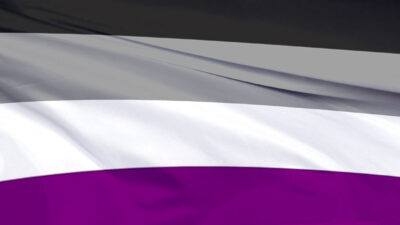Growing up trans and asexual
In this guest blog Tobias Hunter, co-president of the University of Liverpool’s LGBT+ Society (at time of writing), speaks about their experiences of being trans and ace, and the media representation of ace people.

Going through puberty can be a struggle for anyone, but for a particular population within our society it can be hell on earth. I still remember the shock and horror I experienced when I began my first bleed and how I spent the week curled up in bed crying until the tears would flow no more – not because of any form of pain but from the confusion more than anything else. I didn’t understand why I was going through this ‘rite of passage into womanhood’ when I was so clearly a man.
‘Transgender’ wasn’t introduced into my vocabulary until many years afterwards and so I had no words to describe what I felt, except betrayal at what my body was doing to me. But while I slowly began to come to terms with my identity as a trans man, and later as non-binary, there were still parts of the puzzle that didn’t fit or align with the experience of the other trans individuals I met.
I had settled on describing myself as gay since I could imagine myself settling down with a masculine partner but not a feminine one. However, I never experienced the same urges as my peers seemed to, never had the drive to ‘jump someone’ as a classmate put it, and the thought of kissing or cuddling or even so much as holding hands with another person disgusted me. For a long time, I chalked this up to the repulsion I had for my own body and thought it no more than another form of dysphoria along with my hatred of my breasts, my height, and my hair.
Ace people growing up are left with no explanation as to why they don’t feel the same way.
If I had not been struggling with my gender identity and subsequent rock-bottom self-esteem and body image issues that followed, maybe I would have figured out my asexuality sooner. Or maybe not. Having met many more people on the ace spectrum since, it’s becoming ever clearer that the oversexualisation of celebrities in the media, the appearance of a sexual subplot no matter how irrelevant to the film (see Captain America’s kiss with Peggy’s great-niece in Civil War), and the ever-living societal pressure to get married and have children means that ace people growing up are left with no explanation as to why they don’t feel the same way. As a result, many of us end up questioning whether we ourselves are merely broken?
If you were to believe the few pieces of representation of ace people on screen, then you might be led to question that too. If Dr House from medical drama, House, is to be believed, you might too think that there is always a ‘medical reason’ for our asexuality. Were we abused or traumatised as children? Is something suppressing our libido?
But, searching for a cause implies that being ace is a ‘dysfunction’, and that there must be some reason for it - some way to explain away our ace identity, some way that doesn’t threaten the fabric of our heteronormative society.
Understanding your identity and knowing that it is valid means questioning what we are taught by society.
Understanding your identity and knowing that it is valid means questioning what we are taught by society. Just as being trans forces you to rethink what you thought you knew about gender, being ace means disentangling the expectation that your happiness depends on being in a relationship.
Gatekeeping is rife in both the ace and trans communities. Wherever you look, wherever you go, someone will be telling you how you must live your life and what you can or can’t identify as. Whether it’s rules around libido, porn, masturbation, and arousal, or rules around dysphoria, hormones, choices to transition or not, to have surgery or not… the list is endless, and no matter where you fall you will always come across someone who seeks to invalidate your identity.
One thing I have come to accept on my journey to discover where I truly belong is that we have no business attempting to police anyone’s identity. I so often hear the arguments that aces don’t face the same oppression or discrimination as others in the LGBT+ community. I hope the parallels I’ve drawn here in my experience as a transgender and asexual person will prove them wrong.
This Ace Week take a moment to consider and reflect on your actions and words. As members of the LGBT+ community, we should know how isolating and heart-breaking it is to face constant discrimination and erasure in our lives and why it’s so important that we show up as allies to each other. No matter who they may or may not love, whether they’re trans or not, or what their feelings are about sexual relations, all aces are a part of the LGBT+ community, and you may have more in common with us than you think.


